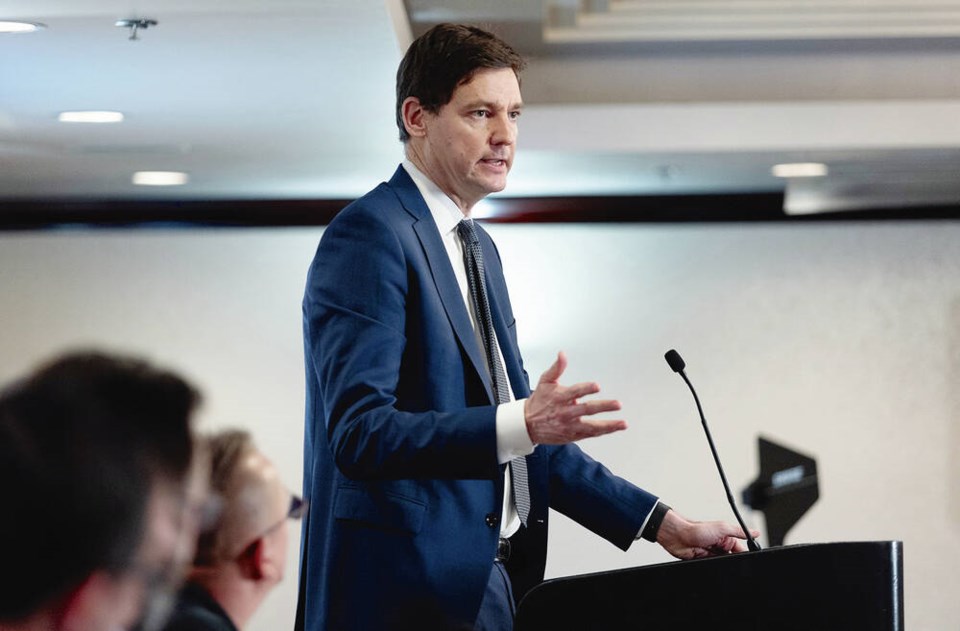The B.C. NDP used its majority on Monday to block a BC United motion to vote on scrapping the three-year drug-decriminalization pilot, days after saying it wants to ban drug use in public areas and hospitals.
Premier David Eby said while the ban on public use of illicit drugs is needed, he has no plans to end the pilot, which began in January 2023.
“It is very clear that the public drug use that we’re seeing, some of the problematic conduct that we were seeing in communities, is unacceptable to British Columbians and it’s unacceptable to me, and we had to address it,” Eby said at a housing announcement in Langley on Monday.
But Eby said arresting someone struggling with addiction and taking them to court does not deal with addiction or save lives. “It is a significant use of time, energy and money that could be better put towards treatment or rehabilitation.”
On Friday, the province — which in 2021 asked the federal government to “decriminalize” possession of small amounts of drugs for personal use — asked the federal government to amend its exemption from drug laws to “re-criminalize” both possession and use in public places for public safety reasons.
Police and Crown counsel will be encouraged to focus on individuals who are causing a threat to public safety, said Eby.
Use of personal amounts of hard drugs in private residences, as well as shelters and overdose-prevention sites, would continue to be allowed.
Toronto has also requested an exemption from Health Canada. Toronto Public Health said in a statement that it is monitoring B.C’s experience, adding that in its proposed model, public drug use would remain illegal.
Ontario Premier Doug Ford repeated his call Monday for Toronto to drop that application, saying he’s spoken to Eby about how things have gone in B.C., and said “it’s turned into a nightmare.”
But Eby said other jurisdictions can learn from B.C.’s experience when it comes to public drug use. “There are important lessons to be learned on where we are to date that don’t need to be repeated in other places,” he said.
The federal Conservatives lost an attempt Monday to hold an emergency debate on the drug crisis.
Harm-reduction activists have balked at the province’s proposed amendment banning public drug use, arguing it will drive drug users to hide their addictions from police, and some will die as a result.
The 4,000-member strong Moms Stop the Harm was set to testify before a federal standing committee on health on Monday to urge parliamentarians to “stop the angry, harmful and polarizing rhetoric and social media posts and to listen to people who use drugs when developing drug policy.”
Moms’ co-founder Leslie McBain of Salt Spring Island, who lost a son to toxic drugs, called the proposed ban a “step backwards.”
“I think the government is making a mountain out of a molehill for the number of places and times when people use publicly that there has been issues.”
The province initially attempted to ban drug consumption in parks and beaches through legislation, but that was suspended by the B.C. Supreme Court after a Charter challenge by the Harm Reduction Nurses Association. Eby said he was advised last week the challenge could last more than a year, adding federal laws are less likely to be successfully challenged.
Corey Ranger of the Harm Reduction Nurses Association said the province’s “end-run” around the group’s court challenge “pushes people who use drugs out of sight to covert and isolated use … we don’t want people to die hidden in alleyways.”
The move to ban drug consumption in public places follows a public backlash against open drug use, police complaints that they don’t have the tools they need to keep public order, and nurses reporting drug use and drug deals in hospital rooms.
The challenge is to keep people who use drugs alive “to get them the opportunity to get into treatment to rebuild their lives,” but safety for all must come first, said Eby.
Since the toxic drug crisis was declared a provincial health emergency in 2016, more than 14,000 have died.
The province has also been opening new treatment and recovery centres and services as well as trying to open more overdose-prevention sites.
- With files from Canadian Press



